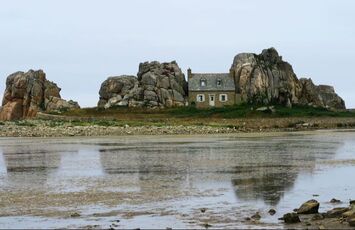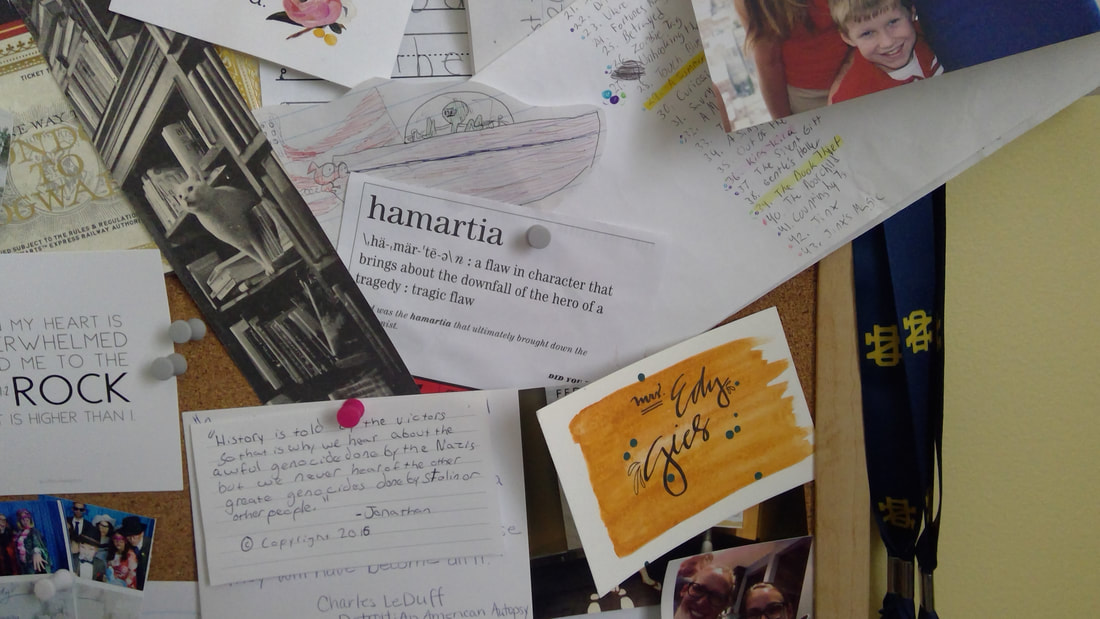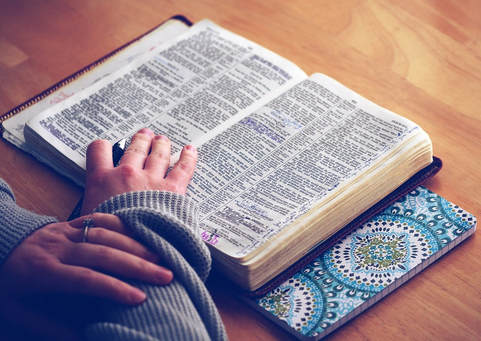|
In my most recent post, I wrote that our purpose in living is to glorify God. I explained that God is worthy of our praise and that we can glorify him by living in a way that points to him. We can eat the food he created - real, delicious, full of flavor. We can build in ways that create sturdy structures that protect human life while incorporating design principles that speak to the created order. We can care for our animals making sure they are fed and cared for and grow native plants in our gardens that add to the local ecosystem. I’ve been teasing that I’m going to be writing about women’s issues. Is a post about glorifying God just dragging my feet? Am I afraid to start writing about this? Well, yes and no. I’m not dragging my feet. I’ve got a ton going on and it is easy to set aside writing to care for more immediately pressing issues. Yes, I’m a little scared to write about what I’ve read because it is controversial and nuanced. People have deeply held opinions built on misconceptions that are difficult to unravel from the truth. I’m trying to organize my notes and provide accurate, orderly information. So why did I take the time to write about our need to glorify God? You might not like this answer, but it is because of Barbie. Yes, that Barbie. In the 2023 Barbie movie, there’s a song called "What Was I Made For?" The song is beautiful, contemplative, and heartbreakingly sad. Sung by Billie Eilish the lyrics state plainly how many women feel. They feel frustrated and lost. America Ferrera’s speech in the film drew millions of comments and views from women saying it expressed exactly how they feel. If you haven’t listened to them you should. If you listened to them and the feelings expressed are completely foreign, that is wonderful. I don’t wish frustration or sadness on any woman but please don’t use your own experience to diminish the experiences of others. Many movies have promoted feminism or the ideals it teaches but Barbie lays it all out for the viewer. Through Barbie, women are expressing how they feel living out third wave feminism. It is a significant cultural moment because many women recognize themselves in the confusion and want an answer to the question, “What was I made for?” The other issue that the Barbie movie dealt with is women's ability to be everything. It's the tagline of the movie - She's everything. He's just Ken. Barbie can be anything - Astronaut Barbie, Teacher Barbie, Lawyer Barbie, Doctor Barbie, and the list goes on and on. This you-can-do-it-all attitude is straight out of the philosophy of Simone de Beauvoir (feminist philosopher and author of The Second Sex, 1949). "The modern woman, she argues, is not free, but divided. She cannot escape the demands of the feminine world, even while jockeying to succeed in the masculine world. She has to live both like a man and like a woman, and 'her workload and her fatigue are multiplied as a result.'" (From Abigal Favale, The Genesis of Gender: A Christian Theory) Combining this philosophy, biological clocks, and innate desires makes women feel like they should be able to have a career, family, social life, a healthy body, and a clean and well-ordered house, but since that is clearly impossible hopelessness ensues and we're back to looking at what our purpose really is.
We’ve all had something in our house of undetermined usefulness. It usually just shows up on the counter one day and you find yourself asking family members, “What is this? Where is it from? Who brought it home?” If you can’t find a purpose for the item it is usually tossed into the trash. There is no point in useless things. That’s why we have to start with finding our purpose. Women have a purpose and it isn’t to get married, have children, bake bread, or look pretty. Many women do get married which is wonderful. I’d give the experience five stars - highly recommend. Having children is incredible - literally forming the next generation - life-changing! Baking bread is terrific, although I’d rather eat bread than bake it. (I still haven’t attempted a sourdough and I am not interested in trying.) If looking pretty is my purpose I’m in trouble. I CAN look pretty but at least 50% of the time I’m not even trying to. I’m not an object to be viewed. I am a human being with intrinsic value. (Psalm 139:13-16) But where does that value come from? It comes from God. God created each of us and he didn’t create us to do everything like Barbie can. He promises to order our steps and be our helper and guide. All we have to do is glorify him and live ordinary lives. “The Lord makes firm the steps of the one who delights in him; though he may stumble, he will not fall, for the Lord upholds him with his hand.” Psalm 37:23 So today, I would like to offer you hope. The hope of knowing you were made for a purpose. If you don’t know God, I would be happy to introduce you to Him. I want you to feel, to be alive, to be cared for, to know you have value, to know that you have a purpose. You don't have to be everything which is great news because you can't be everything, but you can be loved, wanted, full of hope and joy.
1 Comment
Looking out over my snowy backyard, I fondly recall one of my favorite springtime activities -- \ planting my container gardens. I use plants that spike up, plants that fountain down, flowering plants, and foliage plants. Each year I mix the pots up a bit but, I always include a coleus plant. Coleus is a gorgeous foliage plant but there’s always a struggle with it. The coleus wants to create flowers and go to seed which will end its life cycle. I don’t want this to happen so regularly I go through my containers and pop off any flowering growth. Unfulfilled, the coleus will continue to produce gorgeous leaves. While working to maintain this beautiful plant, I considered how specifically this little plant knows its purpose and works to fulfill it. Do you long for that? Have you ever wondered at the world around you and thought, “Why am I here?” or “What am I supposed to be doing with my life?” If you’ve thought that, you aren’t alone. Philosophers and scholars have pondered these questions. Thousands of self-help books have promised to help readers find the answers. They tell people to find something they love, seek to make themselves whole, make themselves happy, help each other, and the list goes on. Wouldn’t it be great if we could know our purpose specifically? According to the Westminster Shorter Catechism, the chief end of humans (our purpose) is to glorify God. 1 Corinthians 10:31 was the school verse at the Christian school where I grew up so it was something I quoted every day for several years. Despite all that quoting I still had an incomplete understanding of what it meant to glorify God or how that was achieved. Some said it was by doing excellent work and performing to the best of our ability. This seemed to fall flat because everyone can (and should) do a good job and work hard. How does that glorify God? Now my son attends that same school and his class chose that verse as their class verse. Never truly having understood it and desiring to find a simple way to explain what it means has lead me to spend the last few years pondering the question, “How do we glorify God?” Here’s what I concluded in a simple enough form that I can explain it to myself and young people: to glorify God is to point others to him. We do it when we sing “Jesus Loves Me” we are sharing the Truth that points back to God. When we sing “Nothing But the Blood” we are sharing that Jesus is the way of salvation. Everything we do should point back to who God is. When we cook good food we share the bounty that God has provided and consume the wonderful flavors and textures that God created for us to enjoy. Everything we do should point to God. Some of this involves motivation which is why this is a command to each person individually. If I bake Christmas cookies to thank my neighbors for being awesome and share the love of Christ with them I am glorifying God. If I bake Christmas cookies to demonstrate that I am better at baking than they are, I am seeking to glorify myself. In both circumstances the neighbors get cookies, but in only one of the circumstances is God glorified. You might be saying, “That’s really confusing!” You’re not wrong. But the more you think about it, the more it makes sense. If you’re given a gift, even one you really like, you can usually tell the motivations of the giver. My neighbors might not notice the first time, but they would pick up on my prideful and condescending attitude at some point and see through my selfishness. But if I give out of a desire to show love and Christ that will also become apparent as I live that out around them. 1 Corinthians 10:31 says, “So whether you eat or drink, or whatever you do, do it all for the glory of God.” But doesn’t that sound kind of egomaniacal? Why is it okay for God to demand our adoration and praise? If I was leading you and asked you to follow me and give me your adoration and praise, you would quickly discover I don’t deserve your praise and glory. I make mistakes, I’m selfish sometimes, I forget things, and I’m a hot mess and can behave unpredictably. Quickly, you would be fed up and move your adoration and praise to someone else. I’m not worthy of your glory and neither is any other human. In Revelation John is in heaven and the angel asks an important question. “Then I saw in the right hand of him who was seated on the throne a scroll written within and on the back, sealed with seven seals. And I saw a mighty angel proclaiming with a loud voice, ‘Who is worthy to open the scroll and break its seals?’ And no one in heaven or on earth or under the earth was able to open the scroll or to look into it, and I began to weep loudly because no one was found worthy to open the scroll or to look into it. And one of the elders said to me, ‘Weep no more; behold, the Lion of the tribe of Judah, the Root of David, has conquered, so that he can open the scroll and its seven seals.’” (Revelation 5:-1-5) So God, Jesus Christ, and the Holy Spirit are worthy of your praise. You are not and should not be the focus of your life. I am not God and should not be the focus of my own life. We are not God. God is worthy. We aren’t. So, Why are we here? What is our purpose? Everything we do should point to God. If you’re not quite sure what that looks like or how you can talk to God about that, maybe this can help us understand. When Mary was told that she would be the mother of Jesus through a miraculous virgin birth she praises God with the following exclimation: “My soul magnifies the Lord, and my spirit rejoices in God my Savior, for he has looked on the humble estate of his servant. For behold, from now on all generations will call me blessed; for he who is mighty has done great things for me, and holy is his name. And his mercy is for those who fear him from generation to generation.” (Luke 1:46-50) Let’s look at her first line. “My soul magnifies the Lord.” The word magnify means to make bigger, but not in the way that a microscope magnifies things but more in the way that a telescope makes faraway heavenly bodies bigger. Here’s an example. The Andromeda Galaxy is a barred spiral galaxy and is the closest major galaxy to the Milky Way, where the Solar System resides. It is 2.5 million light-years away from Earth. The radius is 110,000 light years. So if you wanted to go from the outside to the center it would take you 110,000 million years to get there.
On a clear night, you might see a tiny spot in the sky that is the Andromeda Galaxy, but with telescopes like the Hubble telescope or even powerful telescopes here on Earth, we can see more details. The telescopes magnify something that looks impossible to see but is actually massively large. God is the all powerful soverign king of kings but to those who don't know Him He can feel distant and incomprehensible. We magnify, point to, or glorify God when we show others who He is. When we reflect his beauty, love, grace, justice, and peace. I'm going to be spending some time on this topic and posting about it on my social media to provide more understanding. If you want to find out more and grow with me you can find and follow me on the links below. One of the many things my students used to tease me about was my use of the word “favorite”. I tend to be fickle in my tastes and don’t really have any one thing that I can say I prefer above all others. I often make choices based on how I’m feeling at the moment. Sometimes my favorite lunch is salad; sometimes it’s guacamole and tortilla chips. Sometimes I want to go out for Italian food while sometimes I am hungry for steak. Sometimes I want to sit down with To Kill a Mockingbird while other times I crave non-fiction like The Devil in the White City. Students would mention a book during class and more often seemed logical I would say, “Oh! That’s my favorite!” I enjoy discussing books with people and sometimes the question, “What’s your favorite book?” is asked.
Now here’s the part where I’m going to be very real with you. My least favorite answer to that question is, “The Bible.” I know, I know! It’s the Bible! It’s the literal Word of God. But as an answer to that question, it seems like such a conversation-stopper. I’m excited to talk about being entertained by Pride and Prejudice or To Kill a Mockingbird and this answer comes across as demonstrating spiritual superiority. Maybe it’s not intended that way. I feel terrible about being annoyed by this answer but when I consider my feelings there’s a good explanation for my annoyance. The Bible is a big book. It is 66 books that vary in genre telling a meta-narrative of creation, fall, redemption, and restoration. When I was younger I would read it out of a sense of obligation one chapter at a time. The reading was painful because it was confusing and the sense of obligation made it a drudgery. For a while, on the advice of some lesson I heard, I tried to read until I found something to me. This was really hard to do particularly when reading through the law or genealogies. At some point, I gave up and did daily devotionals (sometimes) just to keep from feeling guilty. Then around 2012, I had a crisis of faith that drove me to ask, “Is all this really true? Am I wasting my time with all this God stuff or is there something worth clinging to?” I thank God daily that through a series of circumstances, I came upon friends and a congregation of believers who loved me and pointed me to God. They didn’t guilt me or push but they loved me, prayed for me, and left room for God to work. I started wanting to read the Bible because I wanted to see what it said. I hadn’t really considered the meta-narrative before so I wanted to learn about that. I read The Story and found myself riveted. I knew what was going to happen but I still couldn’t put it down! It was so exciting. Later I read The Books of the Bible which is the entire Bible with the chapter and verse numbers removed. You may think, as I did, that those aren’t a big deal, but boy, I was shocked to see how much clearer the text was. It was challenging to search and mark passages so I understand why we have the divisions we have but still deeply appreciated this read-through. For the last several years I’ve been on a quest to read through several different versions and so far I’ve read the KJV, NASB, NLV, HCSB, and the NIV. I'm currently working through the ESV but that’s going to take a while because I’m doing it one study at a time. I’m about a year six months in and I’m only through Psalms and sixteen chapters of Genesis. My reading is challenging as it changes me, exciting as I make connections and understand more about God, and enjoyable as I read along with the millions of others in our time and in ages past who have read and loved the same book. So what does all this have to do with my annoyance at answering “The Bible” when asked to name my favorite book? I think it’s because although it is a book I see it as so much more. It is fair to say that every book I’ve ever read has had some kind of impact on me. The words have made a difference in my life, which is why I love reading so much. In Pride and Prejudice, I see a beautiful love story, a quirky family, and a strong woman who refuses to settle for the life society has foisted upon her. In To Kill a Mockingbird I see the horrors of racism and prejudice through the innocent eyes of a child. I love these stories, but I would not die for the book itself or for the authors. In contrast, the Bible is a book full of ancient truths that are living and active. I would die for this book and its Author. I’ve seen this book change lives and I’ve seen people react in strong opposition to it because they hate its Author. I’m going to start posting the results of the last several years of reading, listening, watching, visiting, and interviewing people about women. Before doing so I want to clearly state that my foundational book, the book I try to consume daily, the book that has changed my life is the Bible. I love it. I would die for the words it contains and it is important to me that you know that because it will be my foundational premise. I look forward to sharing the things that I’ve learned and hearing from you about them. It was few days into the New Year and I found myself sobbing while sitting on the floor amid a mess of Christmas decorations, storage boxes, and semi-decorated trees. Every year I like to take the ornaments off the trees while watching the Rose Parade. Jason and Logan wish the decorations would stay up a little longer but I like starting January 1 off by putting Christmas away. Our little debate has become a tradition and one that I didn’t know how much I loved until it was gone. No Rose Parade, no decorations taken down and, suddenly, everything was just “off” about this new year.
I knew there wouldn’t be drastic differences between December 31 and January 1, yet there’s always that hope ushered in by a new year and it was already dashed. Everyone had so loudly protested that 2020 was the worst year ever and the idea that its end would bring a promise of change. Now 2021 was only a few days old and the virus was still here, political tension reigned in the land, and 2021 was proving that hope in this new year would provide disappointment. Eventually, all the Christmas decorations did come down and the house is now back in order, or at least our version of it, but I’ve been thinking a lot about hope. Not the hope that hopes I find my lost keys or the hopes that I have for Logan’s future, but rather the hope that my heart looks to when it is in trouble, the thing that anchors my soul. The song lyrics, “My hope is built on nothing less than Jesus’ blood and righteousness,” have been stuck in my mind and I’ve been thinking a lot about Hebrews 6:19 “We have this hope as an anchor for the soul, firm and secure.” Today’s Word: Hope One syllable. Pronounced [hohp]. Verb. Defined on Dictionary.com as “to look forward to with desire and reasonable confidence; to believe, desire, or trust” As Biden was sworn in as President of the United States people around our area began shooting off fireworks. Of course this sent Samoa scrambling upstairs convinced that we were under attack and that it was every man, or dog, for themselves. Today my social media feeds are full of celebration and hope for the future. People are happy that their daughters have hope in Kamala Harris becoming VP. People are looking forward to so much and it makes me sad. I’m not sad because I hate the elected officials or because I disagre with their idology. I’m sad because I see people building on the wrong foundation. In Matthew 7:24-27 Jesus tells the story of two builders. One builder built his house on the sand. I’m sure it was a great house with a great view, but when the storm came the house fell flat. Its foundation was unstable and provided no protection. The other builder built his house on the rock. Maybe this house had a great view as well or maybe it didn’t, but what matters is that when the storm came, the house stood firm. It didn’t fall down or suffer damage. My favorite image to illustrate Psalm 46 is that of a lighthouse pelted by giant waves. God is our refuge and strength and so because of that we can be still and know that he is God. The quality of the building materials isn’t the point here. This isn’t the story of the three little pigs. This is about foundations. What is your house built on? My literal house is built on a solid foundation that includes a basement. My spiritual house is also built on a solid foundation, the Lord Jesus Christ. I know that I have a created purpose so I seek to fufill that purpose with confidence in a future hope. Please understand I am not being critical of those who are hoping in VP Harris. I don’t know if she will meet their expectations for her or if she will fail to meet them, but I know she is human and that in this era of cancel culture we have seen so many people fall from the favor of those who once supported them. Today, people who once cheered for and supported VP Pence are calling him all sorts of names including traitor. The point is that people dissapoint. In this era of the mind-bending convergence of cancel culture and “don’t judge me” attitudes, it is radical to say that one thing is sure and trust worthy. We are in an era when nothing and no one seem trust worthy and yet I choose to trust God. I have seen Him working in my life over and over and I will follow him. I don’t do this because I’m a wonderful person. I am a person who really wants that beach front house built on my own fabulous ideas, but I’ve seen the damage done by storms that have destroyed my attempts to build anything off a solid foundation. So where is your hope? Is it in someone or something that might disappoint or is it in the unmovable and unchanging God? I’m currently reading through the Bible using the R. M. M’Cheyne reading plan which will take me through the Old Testament once and the New Testament and Psalms twice. I’m not doing this because I want to check a box everyday but because I want to know the God that I serve. I want to live in the knowledge of him so that I can honestly say, “For me, to live is Christ and to die is gain.” I’m not certian of anthing this 2021 except for knowing that God is the unchanging and unmovable rock I upon which I will build my life. As you may have heard, we are living in unprecedented times. Just kidding - I’m sure you’ve heard this 1,000 times. It’s mentioned at least five times during each press conference and at least twice during each news broadcast. These unprecedented times have us all scrambling and doing new things. I’ve tried at least 10 new recipes (several of which are winners). Kids are trying new home science and craft projects they didn’t have time to do before. Parents are realizing just how hard teachers work to educate their children.
Many of us are getting frustrated and antsy to get back to life while others navigate the phases of reopening. To some, staying home feels like a waste of time and every day begins to look like the day before it. Our days seem like anything but unprecedented. It’s all been done before. Sun goes up, the sun goes down. Tomorrow and tomorrow and tomorrow creeps in this petty pace from day to day to the last syllable of recorded time. Our frustrations begin to sound like Solomon in Ecclesiastes 1, “What has been will be again, what has been done will be done again; there is nothing new under the sun.” How depressing! At the beginning of Ecclesiastes, Solomon sounds like he could sit and commiserate with Macbeth. I imagine them sitting languidly staring into a fire. Macbeth: “All our yesterdays have lighted fools the way to dusty death.” Solomon: “All things are full of weariness; a man cannot utter it; the eye is not satisfied with seeing, nor the ear filled with hearing.” By the end of his pondering though, Solomon has moved on and left Macbeth behind. He concludes, “The end of the matter; all has been heard. Fear God and keep his commandments for this is the whole duty of man.” So that is it. As followers of Christ we are not promised freedom from trouble. In fact, Jesus said, "In this world you will have trouble. But take heart! I have overcome the world.” (John 16:33) You will have trouble - not great words to put on a recruitment poster, but praise God the promise doesn't end there. Christ overcame the world and through him we are more than conquerors. There is so much debate about masks, reopening, social distancing, etc. We must research, ask questions, seek out reputable sources for answers, and responsibly share with our people. Our first priority should be raidating Christ's message to the world so we should be very cautious about alienating people with charged political statements. Fear God and keep his commandments. Not exactly the easiest conclusion to execute, but that's what we've been given. Even if the days are looking the same and things become monotonous God is there. God is good and His way is perfect. Earlier today, I wrote a really frustrated sad article about how much I'm struggling with Logan and his school work which I never published and have since deleted. I'll spare you that rant and just leave it at - we're struggling. Some of it has to do with executive function disorder which deals with organization, working memory, and attention. I constantly feel like I'm behind in some way. Like I'm treading water wearing a weighted vest.
Something else I'm struggling to accept is that I can't do it all. This year I had grand dreams of learning French, reading a big stack of books, learning to play the piano, getting into shape, keeping my house clean, making crafts for a PTO event, and keeping on top of writing letters to family and friends on top of writing my blog, preparing two more historical presentations, and working on a side writing project. I tell myself that because I'm not working full time all this should be possible, but I'm so wrong. Instead, I find myself shriveling in, depressed by my lack of progress. I've been successful at getting into shape and am currently training for the Detroit half-marathon in October. Yay! But the time spent training has got to come from somewhere and my other efforts suffer. I'm slowly trying to accept that I can't do it all. So my greatest struggle right now is being content. I've been trying to find contentment, but can't when I compare myself to other moms or chase unattainable goals. So how can I find contentment? What is the secret to finding contentment in the midst of turmoil? Fortunately, Paul told it to the Philippians in his letter to them. "I have learned to be content whatever the circumstances. I know what it is to be in need, and I know what it is to have plenty. I have learned the secret of being content in any and every situation, whether well fed or hungry, whether living in plenty or in want. I can do all this through him who gives me strength." This verse isn't about winning a sporting event or doing your best. It's about contentment in any and every situation. It's the secret, the key, the linchpin. So I can live contentedly in the situation God has placed me in and I can accomplish what he wants me to. Just so we're clear, this isn't easy though. I'm not quoting a quick verse then heading of to a perfect person soiree. The struggle is real, but at least I know the secret to success. So tonight, I hope you find yourself in positive circumstances, but if not, I'll take this opportunity to share the secret with you. Christ gives strength.  One of my favorite shows growing up was the A-Team. The falsely accused Green Berets hid out in the Los Angles underground helping underdogs that were being oppressed. Often they would be overtaken and locked up by the bad guys or trapped by some scheme. (Inexplicably, they were always trapped with lots of power tools and fixable equipment.) The leader, Hannibal Smith, would devise a plan and the team would execute it. After achieving victory, he would always say, "I love it when plan comes together." As a learner, I love it when my reading combines to form a concrete and deeply understood idea. As silly as it seems, I get that satisfied feeling of everything coming together as it was planned to be. Today's word is an example of this coming together of ideas. In my previous career as an English teacher, I was teaching Macbeth and discussing the concept of a tragic or fatal flaw. In Shakespeare's tragedies, the characters have a tragic flaw which is the ultimate cause of their destruction. In the plays we studied, the characters get what they want, but not in the way they saw it happening. Romeo and Juliet want to be together forever. They get that, but their togetherness is in death, not life. Macbeth is ambitious and wants to be above the rest as their leader. At the end of the play, he is raised up, but it is his head on a pike that is raised. As I was teaching this concept, a student said, "There's a word for that." Questioning her I said, "A word for what?" She said that there was a word for a tragic flaw, but she couldn't remember what it was. She had read it in The Fault in Our Stars by John Green. I had read the book myself and but had missed that part. Fortunately, she knew where it was mentioned in the story and I had a copy of the book on my Kindle. We looked it up and, sure enough, found it. The word was hamartia. Around the same time, I purchased the book The Ology: Ancient Truths Ever New by Marty Machowski. It was recommended to me by a friend. The book teaches systematic theology to young children by breaking down the concepts into very understandable ideas with many illustrations. They call things "The Ology of of God" or "The Ology of Christ" instead of Theology or Christology. This helps kids understand and grasp the understanding that "ology" simply means "the study of." One of the "ologys" mentioned is "The ology of sin". I was looking up the actual name of this ology and discovered that it is Hamartiology. At this point, it hit. Sin is our tragic flaw. When I looked up Hamartiology the sources said that in Hamartiology, hamartia is defined more as the missing of a mark, because sin keeps us from missing the mark of God's glory and perfection. (Romans 3:23) But I think that the tragic or fatal flaw definition also makes sense here. I brought this back to my class and we discussed the impact that sin has on us. Although mankind was created perfect in God's image, sin marred that perfection and became our tragic fatal flaw. Today's Word: Hamartia Four syllables. Pronounced [hah-mahr-tee-uh]. Noun. Defined on dictionary.com as a tragic flaw. Today, I challenge you to contemplate your own tragic flaw. The sin that you cannot conquer on your own that only Christ can clean up for you. It can get overwhelming, but praise God that he didn't leave us without hope and offers us salvation from our hamartia. I would also like to mention that this discovery was made possible by three things. (1.) The Holy Spirit guiding and directing in my life. (2.) Reading a wide variety of books on a wide variety of topics and reading what the students in my classroom were reading at the time. (3.) A classroom that allowed for expression and curiosity. I allowed the student to question me and my limited knowledge regarding the word for a tragic flaw. I indulged the curiosity of the moment by stopping the lesson and searching for an answer. I came back to them with updates as I learned from The Ology. This all took time away from my original plans, but the impact was much greater than had we just moved on. Shortly after this, a student brought in a page from his Word-a-Day calendar. I still keep it hung on my wall to remind me of the lessons we learned and the joy I felt in teaching those students.
Okay, I know the title of the post sounds totally anti-God and anti-Bible. That is not all what I am intending to say, but I got your attention, right? I am referring to the danger of using the Bible to get what we want as parents rather than actually parenting our children and teaching them what God's Word has to say. Ephesians 6:1 has been used and over used to the point that some kids can quote it backward and forward, but inside their spirit is angry and resentful.
Mom: "No, you can't wear that outfit." Child: "But WHY? " Parent: "Children obey your parents in the Lord, for this is right." Child: "I can't wait to grow up and get out of here so I don't have to obey you anymore!" (Verbally stated or held internally.) This is not the only verse that is overused or used out of context. Child: "I can't understand my algebra homework." Parent: "I can do all things through him who strengthens me." Child: (sarcastically) "Thanks, that cleared everything up." The examples could go on, but hopefully you get my point. Child is arguing, complaining, or disobeying and the parents response is to throw out a verse and move on like it was a magic phrase that fixed everything. The child has learned nothing other than they needed help from a parent they trusted and that help was not given. Instead they got a quick quote that was empty and lacked love behind it. This is wrong. So what do we do? Should you not teach your kids scripture or avoid quoting it to them? No, but I would assert that there is a way to do it that is gentle and graceful. It will teach them to love God's Word rather than to hate it or twist it to be used for their own purposes.
We can do a great deal of damage when it comes to our handling of scripture and it's presentation to our kids. We can also ruin our testimony by our rants on social media and behavior toward other adults. For now all I can do is try to live out the gospel every day and when I fail, ask forgiveness of my heavenly Father and those around me. |
"A jack of all trades is a master of none, but oftentimes better than a master of one." Archives
May 2020
Categories
All
|
AdventuresGet in Touch |













 RSS Feed
RSS Feed